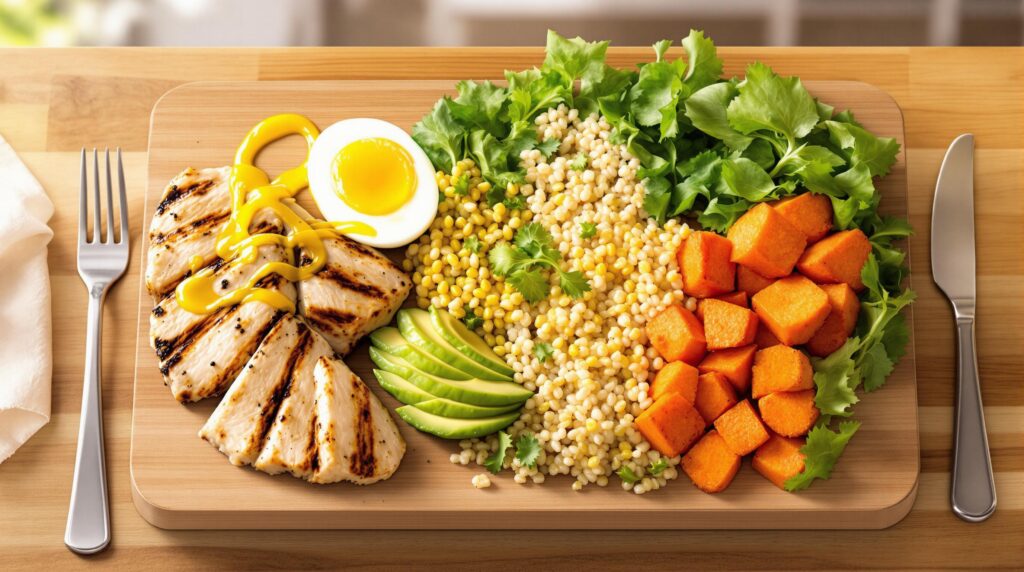Ever wondered why some people can eat more and stay slim, while others find it hard to lose weight? It might be their diet. Adding certain foods to your meals can boost your metabolism. This article will show you metabolism boosting foods that can up your energy and aid in weight loss. Find out the top foods to boost your metabolism and how they can change your diet.
Understanding Metabolism
Metabolism is the process by which your body turns food into energy. It’s made up of many chemical reactions that help your body grow, heal, and function. Knowing how metabolism works is key because it affects your energy and weight.
Your metabolic rate, or basal metabolic rate (BMR), is how many calories your body needs at rest. Things like your genes, hormones, muscle, and age influence your BMR. For example, people with more muscle burn more calories than those with less. This is why exercising to build muscle is important for a good metabolism.
A healthy metabolism helps you burn calories well, keeping you full of energy and feeling good. Eating right and staying active can keep your metabolism in top shape. This helps you manage your weight and stay energized all day.
What Are Foods That Speed Up Metabolism?
Learning about foods that boost metabolism can help you manage your energy and weight. The definition of metabolism is all about how your body turns food into energy. This is key for daily life. Research shows that many things can affect your metabolism, like your genes, muscle, and how active you are.
Defining Metabolism and Its Importance
The definition of metabolism includes breaking down and building up nutrients in your body. Knowing about metabolism is important because it shows how well your body uses food for energy. This energy use is vital for your health, affecting things like body temperature and how you recover after working out.
How Metabolism Affects Caloric Burn
Your metabolic rate is how fast you burn calories, and it varies from person to person. Many things can change how fast you burn calories. For example, having more muscle means you burn more calories even when you’re not moving.
Studies show that some foods that speed up metabolism, like those high in protein, can make your body burn more calories. This is because your body uses more energy to digest these foods. Finding the right balance of nutrients and considering your metabolic rate can help you manage your weight better.
Protein-Rich Foods: Your Metabolism Allies
Protein-rich foods are key to boosting your metabolism. They need more energy to digest, which helps your body burn more calories. Eating protein can make your metabolism go up for hours after you eat.
How Protein Increases Metabolic Rate
Studies show that eating protein can increase your metabolic rate by 15–30%. This is much more than fats and carbs. Your body burns more calories just by digesting protein.
Examples of High-Protein Foods
To get these benefits, add these high-protein foods to your diet:
- Lean meats like chicken and turkey
- Fish, such as salmon and tuna
- Legumes like lentils and chickpeas
- Dairy products, like Greek yogurt
- Nuts and seeds for snacks
These foods help keep your muscles strong and keep you full longer. This reduces cravings and binge eating. Choosing protein-rich foods wisely supports your metabolism. For more tips on healthy eating, check out this resource.

Healthy Fats for a Boost in Metabolism
Adding healthy fats to your diet can really help your metabolism. These fats give you important nutrients and proteins. They help keep your energy up. Let’s look at avocados and the good stuff in nuts and seeds for your metabolism.
Avocados and Their Benefits
Avocados are full of healthy fats, like monounsaturated fats. They keep you feeling full. They also have lots of fiber, which helps with digestion and blood sugar.
They’re great for absorbing nutrients, making them a top snack choice. Avocados are full of potassium and vitamins. They’re good for your metabolism.
Role of Nuts and Seeds in Metabolism
Nuts and seeds are packed with proteins, healthy fats, and fiber. Almonds, walnuts, chia seeds, and flaxseeds are super for your health. They make you feel full longer.
Adding them to your meals or snacks boosts your metabolism. They also offer many health benefits.

High-Fiber Foods That Promote a Healthy Metabolism
Eating high-fiber foods can really help your metabolism. These foods are good for your digestion and can help you manage your weight. They also keep your blood sugar stable. Let’s look at how legumes and whole grains can boost your metabolism.
Legumes and Their Advantages
Legumes like black beans, chickpeas, and lentils are full of fiber and protein. They make you feel full, which helps you eat less. This is great for boosting your metabolism and improving your health.
Adding legumes to your meals keeps your energy up and stops your blood sugar from spiking.
Whole Grains and Fiber Content
Whole grains are also important for a high-fiber diet. Foods like brown rice, quinoa, and oats are rich in fiber and nutrients. They give you lasting energy and help your digestion.
Choosing whole grains over refined ones makes your meals more digestible and fiber-rich. This can greatly improve your metabolic health and lower the risk of metabolic disorders. For more on fiber, check out this guide.

| Food Source | Fiber Content (g per 100g) | Benefits |
|---|---|---|
| Black Beans | 8.7 | Promotes satiety and supports digestive health |
| Chickpeas | 7.6 | Rich in protein and aids in weight management |
| Lentils | 7.9 | Regulates blood sugar levels and enriches meals |
| Brown Rice | 3.5 | Provides sustained energy and essential nutrients |
| Quinoa | 2.8 | Complete protein source, enhances metabolic rate |
| Oats | 10.1 | Heart-healthy, beneficial for cholesterol lowering |
Spices and Their Impact on Metabolic Rate
Adding spices to your meals can really boost your metabolism. They not only add flavor but also help your body burn more calories. Capsaicin in chili peppers, ginger, and cinnamon are great for this.
Capsaicin in Chili Peppers
Capsaicin is a key part of chili peppers. It makes your body heat up, which speeds up your metabolism. Eating chili peppers can make you burn more calories.
This spicy kick can increase your metabolic rate by up to 20%. It’s a great way to boost your diet.
The Benefits of Ginger and Cinnamon
Ginger and cinnamon are great for your metabolism. Ginger helps burn fat and makes you feel full, which can lower your calorie intake. Cinnamon helps control blood sugar, which stops cravings.
Using these spices in your cooking adds flavor and health benefits. They’re a tasty way to support your metabolism.

| Spice | Metabolic Benefit | Suggested Use |
|---|---|---|
| Capsaicin (Chili Peppers) | Increases metabolic rate by up to 20% | Add to sauces, soups, or stir-fries |
| Ginger | Promotes fat burning; supports satiety | Use in teas, smoothies, or curries |
| Cinnamon | Regulates blood sugar; reduces cravings | Sprinkle on oatmeal, yogurt, or baked goods |
Hydration: The Hidden Key to Metabolism
Drinking enough water is key to a healthy metabolism. It helps your body work better by speeding up metabolic rates. This boost in metabolism can help you burn more calories, making it easier to manage your weight.
How Water Affects Caloric Burn
Water is vital for keeping your metabolism in check. Drinking water can make your metabolism 24-30% faster for 30-40 minutes. This is because your body uses energy to process water, which means you burn more calories. Plus, water helps with digestion and absorbing nutrients, making sure your body uses what you eat efficiently.
Drinking Water vs. Other Beverages
Water is the best choice for staying hydrated and boosting metabolism. Unlike sugary drinks, water has no calories. It helps your body work better without adding extra weight. Drinking water instead of other drinks can really help your metabolism.
| Beverage | Calories per 8 oz | Metabolic Impact |
|---|---|---|
| Water | 0 | Boosts metabolism, promotes hydration |
| Regular Soda | 100 | Negatively affects metabolism, adds calories |
| Fruit Juice | 110 | May lead to excess caloric intake |
| Sports Drink | 80 | Contains sugars, may not support metabolism |
Choosing water as your main drink can really help your metabolism. It’s a simple way to stay hydrated and support your metabolic health.
Metabolism-Boosting Superfoods
Adding superfoods to your diet can really boost your metabolism and health. These foods are full of vitamins, minerals, and antioxidants. They help your body work better by being easy to add to your meals.
Top Superfoods for a Healthy Metabolism
Here are some top superfoods for a healthy metabolism:
- Kale – It’s full of fiber and vitamins that help your metabolism.
- Blueberries – They’re packed with antioxidants that fight oxidative stress and boost metabolism.
- Green Tea – It has catechins that increase your metabolic rate and burn fat.
- Quinoa – It’s a complete protein that keeps you full and boosts your energy use.
- Chia Seeds – They’re rich in omega-3s and fiber, helping regulate appetite and improve metabolism.
Why Superfoods are Essential
Superfoods are very important for a metabolism-boosting diet. They help burn calories fast and support your body’s functions. Eating superfoods gives your body the nutrients it needs for a healthy metabolism. Here’s a look at some key superfoods and their effects on metabolism:
| Superfood | Nutrient Benefits | Metabolic Impact |
|---|---|---|
| Kale | Vitamins A, C, K; Calcium | Supports energy expenditure |
| Blueberries | Antioxidants; Vitamins C and K | Enhances metabolic efficiency |
| Green Tea | Catechins; Caffeine | Increases fat oxidation |
| Quinoa | Complete protein; Fiber | Regulates appetite and energy |
| Chia Seeds | Omega-3; Fiber | Improves digestive health |
Incorporating Metabolism-Boosting Foods into Your Diet
To boost your metabolism, add metabolism-boosting foods to your daily meals. Start by planning meals with high-protein, healthy fats, and fiber. Prepare meals ahead to keep your nutrient intake steady.
When planning meals, try new spices and superfoods. They add flavor and nutritional value. This makes healthy eating fun and enjoyable.
Here’s a sample meal plan that highlights the integration of these foods:
| Meal | Main Ingredients | Benefits |
|---|---|---|
| Breakfast | Oatmeal, Greek yogurt, berries | Boosts energy and fiber intake |
| Lunch | Grilled chicken salad with avocado | High in protein and healthy fats |
| Snack | Nuts and seeds mix | Rich in nutrients and satisfies hunger |
| Dinner | Baked salmon, quinoa, steamed broccoli | Excellent protein and omega-3 source |
This meal planning strategy supports a healthy lifestyle. It makes it easier to include foods that boost your metabolism. With creativity and planning, sticking to a metabolism-boosting diet is doable.
Conclusion
Incorporating certain foods into your meals can boost your body’s calorie burn and energy use. Focus on protein, healthy fats, and spices. Also, remember that water is key for your metabolism.
Every small change in your diet can help your health and wellness. Aim for a balanced diet with legumes, whole grains, nuts, and superfoods like berries and leafy greens. These foods can help you lose weight and stay full of energy.
Knowing how foods affect your metabolism helps you make better choices. By choosing the right foods and practices, you can improve your metabolic health and overall well-being.




Pingback: Fiber’s Role in Metabolism: Eat More, Burn More
Pingback: Boost Metabolism Naturally: 25 Proven Micro-Habits